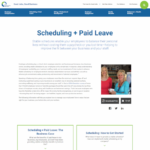Job Quality Tools Library > Section 4: Strengthening Practices to Improve Job Quality > Tools: Scheduling
Originally posted: May 11, 2020
Last updated: September 21, 2023
Section 4, the core of the library, includes tools designed to address specific components of job quality. Once organizations have determined their job quality priorities, they can turn to these tools to shift practices in the areas they have deemed most urgent, either in their own organizations or in the businesses with which they partner.
We’ve organized tools into categories that reflect the job quality attributes most commonly cited across the job quality frameworks and definitions included in Section 1. These attributes include wages, benefits, scheduling, legal rights, equity and inclusion, opportunity to build skills and advance, supportive work environment, worker voice, and employee ownership. Each attribute also includes sub-categories for ease of navigation.
↓ Tools and Resources Below the Box ↓
Library Navigation
- Job Quality Tools Library Homepage
- About This Library
- Section 1: Understanding Job Quality
- Section 2: Assessing Job Quality
- Section 3: Engaging Businesses on Job Quality
- Section 4: Strengthening Practices to Improve Job Quality
- Section 5: Monitoring Improvements in Job Quality
- Special: COVID-19 Response Tools and Resources
- Index of Tools by Field
Tools

Pacific Community Ventures – Scheduling + Paid Leave
Who’s It For: Employers, Economic Development, Investing and Lending, Worker Advocacy, Workforce Development
What’s It For: This chapter in Good Jobs, Good Business – a toolkit for small business owners seeking to improve job quality – focuses on the importance of stable and flexible scheduling in retaining a high quality workforce. It makes the business case for stable scheduling and provides practical instructions on crafting and implementing a scheduling policy. This resource is designed for small business owners but has also been used by partners (including lenders and workforce development organizations) to coach businesses on job quality improvements with potential business benefits.